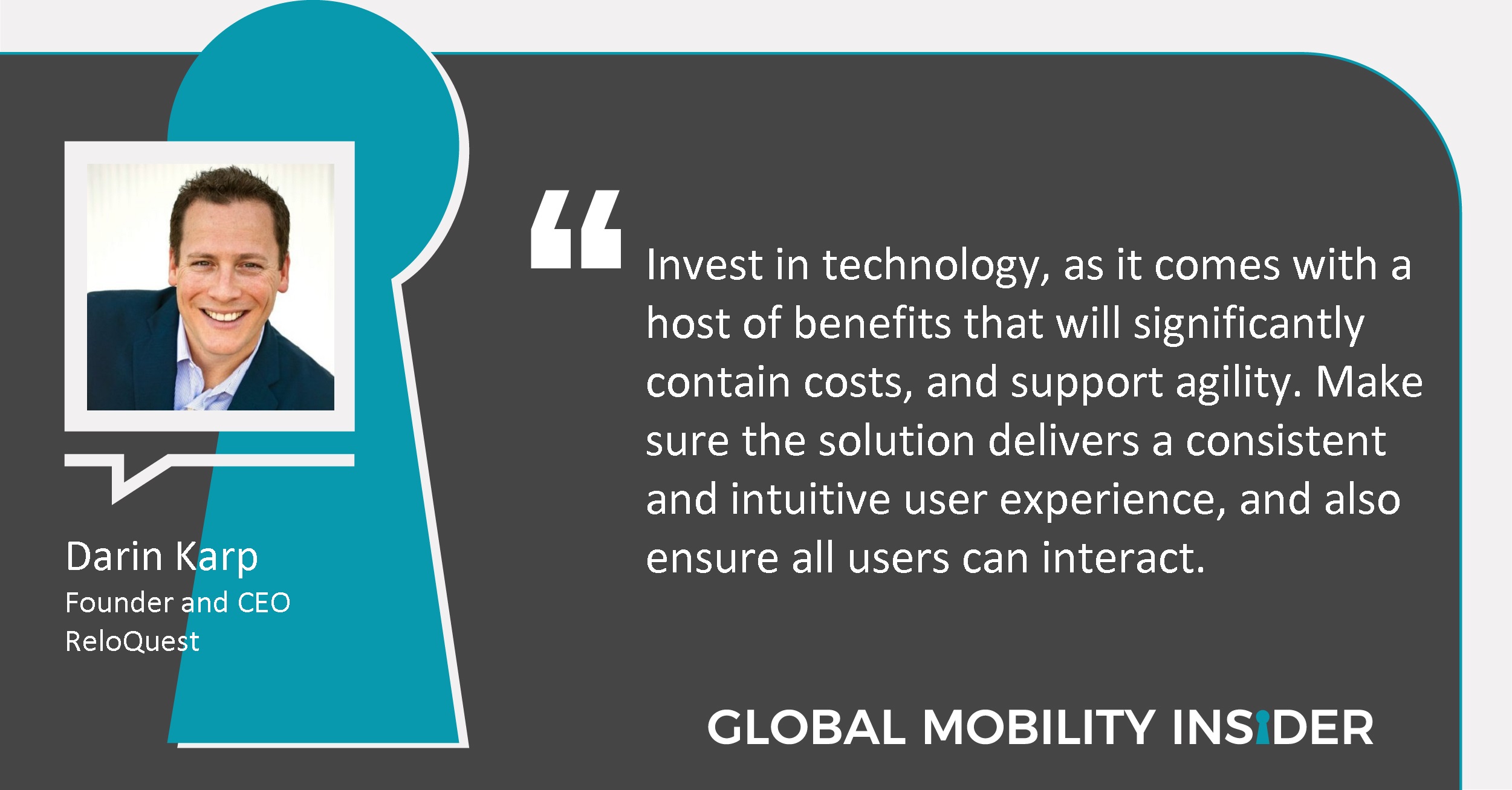Darin Karp - Founder and CEO - ReloQuest
Name: Darin Karp
Position: Founder and CEO
Company: ReloQuest

Professional Background
ReloQuest, Founder and CEO (United States): 2014 – Present
Stress Free Corporate Housing, President (United States): 1999 – Present
Stress Free Realty, President and Broker (United States): 1998 – Present
Career Insider
Q: What lead you to found ReloQuest?
A: Antiquated Industry processes were the reason I founded ReloQuest. Coming from a twenty plus year Corporate Housing background, I was aware of the pain points of HR and relocation professionals. Sourcing accommodation was manual and labour intensive. Neither a cohesive method nor an aggregated solution existed. There was a lack of cost transparency and an inability to acquire data analytics. This inconsistency yielded inefficiencies which benefited the larger operations and hindered many local companies from competing fairly, due to a biased environment.
Additionally, there was not a means of direct communication between clients, suppliers, and assignees. ReloQuest was developed to deliver the strategic direction required to manage sourcing for a global workforce. Today, ReloQuest is a B2B, and B2E (employee) enterprise business solution and self-service platform for employees.
Click & Like on LinkedIn
Q: What advice would you give to someone looking to get into the corporate housing sector?
A: Technology breakthroughs are disrupting numerous industries in addition to corporate housing, so be prepared to embrace change. Expect to commit to continuous learning to keep your skills current. If you are task oriented and have hospitality experience, it will be beneficial, because client-centric service prevails in corporate housing. It is a service industry, and as such follow-up plays a critical role. No matter if you pursue marketing or other facets of the business set goals with the intent of exceeding the needs of the customer. Even our developers have created enhancements that solve specific client challenges. This dedication to client’s success encompasses all facets of the industry and will determine success or failure. Learn about your client base so you can proactively meet their needs.
Even if you're new to the industry and you do not have a clear vision established for your future, you can still be adaptable, willing to collaborate, accountable and empathetic to your client’s needs. Maintain a mindset of seeing challenges as opportunities to grow and excel.
Q: What are you proud of achieving in your career and what's next?
A: Without having a prior application development background, we were able to envision and create a multi-award-winning business solution that can source, compare and book short-term serviced apartments, corporate accommodations, and hotels for relocation management companies, travel management companies, corporate clients and employees.
I am pleased that smaller companies have been able to prosper from a fair playing field due to ReloQuest’s transparency. We could not be prouder of the team we have put together, as they have always managed to turn our client's challenges into cutting-edge, innovative solutions that are industry technology firsts. Through their innovation and collective dedication, ReloQuest has come to be known as the industry gold standard.
We have enjoyed exponential growth with each year since start-up and have consistently increased our in-house team of developers in anticipation of rapid continued global growth. We will soon have announcements to share introducing new multinational clients.
Industry Insider
Q: How do you think the global mobility industry has changed over the years?
A: Global mobility has transformed, and rapid change continues with technology impacting business and driving the future of an ever-changing world. Globalisation has dictated changes in policy approaches; assignment types-short-term assignments are growing in popularity. Cost control, talent management, duty of care, changing regulations and laws; such as the H1-B Visa program and other contributing factors; such as political change all come into play.
Having a diverse employee base benefits the company. Reserving mobility for senior leadership is a thing of the past, nowadays all levels of employees travel internationally. Global mobility plays an integral role in attracting and retaining top talent, especially with a millennial majority workforce who are apt to view a transfer as a career development opportunity. Agile companies are aware of the necessity to create a positive employee relocation experience--sustaining to both employee and company.
Automation has impacted corporate housing and global mobility space. Employees are turning to self-service platforms to manage their mobility.
Q: What is the most important strategic tip you can give to companies seeking temporary accommodation for employees?
A: Invest in technology, as it comes with a host of benefits that will significantly contain costs, and support agility. A company needs to have a measurement process that provides fact-based information to manage effectively and evaluate success. With technology, process accuracy improves, and data insight makes strategic choices apparent. Cloud platforms offer vast cost-effective storage, and mobile apps promote connectivity. Employee engagement affects morale and retention for a business. We believe in creating value for our clients. The ReloQuest platform features a B2E (employee) solution that allows employees the personalized control they want. Make sure the solution delivers a consistent and intuitive user experience, and also ensure all users can interact. Another important consideration would be to invest in a company that is forward thinking and passionately drives efficiencies through API’s, and KPI’s.
Visionary Insider
Q: How can global mobility practices get better in the next five years?
A: Transformational innovation combined with the diversification of talent will bring multiple benefits from cost containment and efficiency to talent retention, return on investment, and more. Companies will be well served to look for talent that can adapt to new technologies and optimize or enhance existing products and services — hiring candidates who display a capacity for complex problem-solving skills, the creativity to turn ideas into practice, and in our case, solutions. Candidates that have an ability for critical thinking and adept people management are also skills in high demand.
HR and mobility professionals will need to be strategic in their approach, making data central to strategic planning. If skilled talent is to be retained, companies will need to weigh the benefits of adapting to talents expectations; such as flexible working conditions and DIY availability. Diversity should continue to play a role in companies overall mobility plan.
Q: What more can be done to benefit talents on the move?
A: Attention to self-service options when planning a relocation. Why shouldn’t assignee’s want to be involved with their relocation, as decisions impact their quality of life and work productivity?
Companies should not underestimate the range of skills HR/mobility professionals need to compete for talent. Many factors come into play, such as technology literacy. Mobility professionals should understand rapidly advancing digital solutions, so they can accurately communicate with employees. Another instance where communication plays a key role is in explaining policy to assignees who should be informed of what is considered proper in a destination that has cultural/societal differences in comparison to the employees’ home.
Q: What are the major developments you currently see happening in the industry, and how do you feel about them?
A: Technology has created a new normal in global mobility and relocation management. Digital innovation supports informed decision making. Reactive relocations are becoming a thing of the past and can prove to be a barrier to success. Technology will continue to have a profound impact on relocation management companies, travel management companies, clients and guests. Companies are incorporating analytics to provide insight, measure costs and increase productivity.
Talent is one of the world’s most valuable resources with globalization, and impending skilled talent storage companies are competing for employees. Work environments are changing. Our CTO has a coach-based leadership style. Our workplace is transparent and conducive to collaboration.
A millennials’ idea of the corporate dream is not always consistent with that of previous generations with this in mind, companies have to adapt to attract and retain new talent. Although likely to embrace international assignments, Millennials can be selective in their destinations. They are said to place high importance on career satisfaction, advancement, and a work-life balance. Relocations professionals should be aware of what motivates their needed demographic.
Either/Or…
- Short-term or long-term assignment? Short term
- Airbnb or serviced apartments? Serviced Apartments
- Excel or global mobility software? Global Mobility Software
- Lump-sum or flex-ben? Flex-ben
- Facebook or LinkedIn? Both are great as they bring different strengths
- Outlook or Gmail? Gmail
- Taxi or Uber? Uber
- iOS or Android? iOS
- Mac or PC? Mac
- Computer or tablet? Computer
- Work hard or play hard? Diehard (both with a fervour; kidding aside, at this time of exponential growth for ReloQuest, working hard has become the priority).


Leave a Comment
* Fields marked with this asterisk are mandatory.